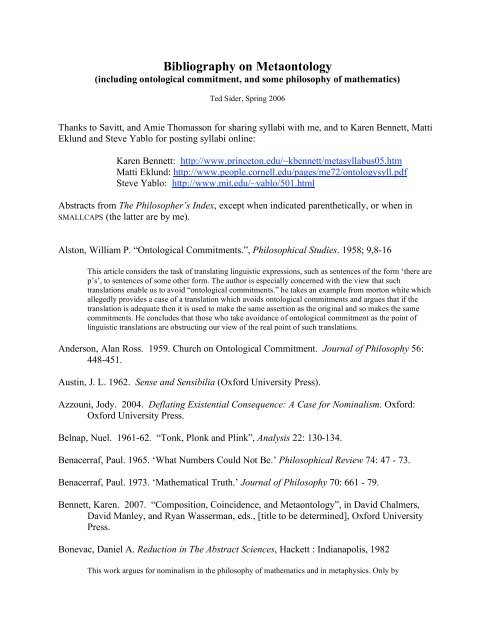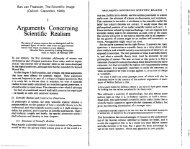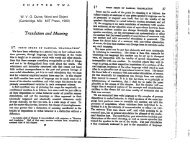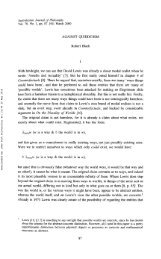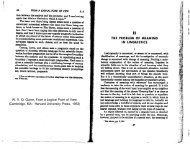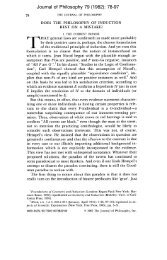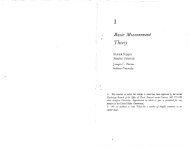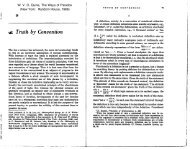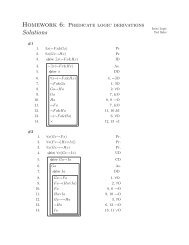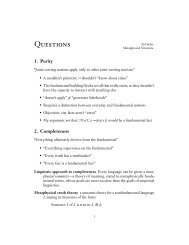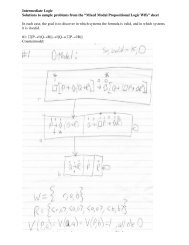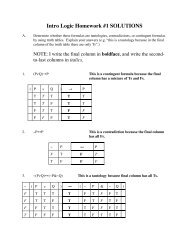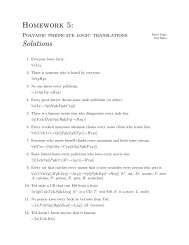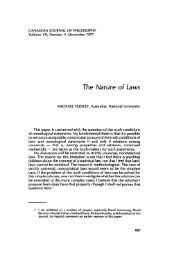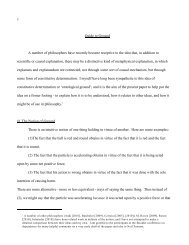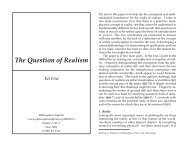Bibliography on Metaontology - Ted Sider
Bibliography on Metaontology - Ted Sider
Bibliography on Metaontology - Ted Sider
Create successful ePaper yourself
Turn your PDF publications into a flip-book with our unique Google optimized e-Paper software.
<str<strong>on</strong>g>Bibliography</str<strong>on</strong>g> <strong>on</strong> Meta<strong>on</strong>tology<br />
(including <strong>on</strong>tological commitment, and some philosophy of mathematics)<br />
<strong>Ted</strong> <strong>Sider</strong>, Spring 2006<br />
Thanks to Savitt, and Amie Thomass<strong>on</strong> for sharing syllabi with me, and to Karen Bennett, Matti<br />
Eklund and Steve Yablo for posting syllabi <strong>on</strong>line:<br />
Karen Bennett: http://www.princet<strong>on</strong>.edu/~kbennett/metasyllabus05.htm<br />
Matti Eklund: http://www.people.cornell.edu/pages/me72/<strong>on</strong>tologysyll.pdf<br />
Steve Yablo: http://www.mit.edu/~yablo/501.html<br />
Abstracts from The Philosopher’s Index, except when indicated parenthetically, or when in<br />
SMALLCAPS (the latter are by me).<br />
Alst<strong>on</strong>, William P. “Ontological Commitments.”, Philosophical Studies. 1958; 9,8-16<br />
This article c<strong>on</strong>siders the task of translating linguistic expressi<strong>on</strong>s, such as sentences of the form ‘there are<br />
p’s’, to sentences of some other form. The author is especially c<strong>on</strong>cerned with the view that such<br />
translati<strong>on</strong>s enable us to avoid “<strong>on</strong>tological commitments.” he takes an example from mort<strong>on</strong> white which<br />
allegedly provides a case of a translati<strong>on</strong> which avoids <strong>on</strong>tological commitments and argues that if the<br />
translati<strong>on</strong> is adequate then it is used to make the same asserti<strong>on</strong> as the original and so makes the same<br />
commitments. He c<strong>on</strong>cludes that those who take avoidance of <strong>on</strong>tological commitment as the point of<br />
linguistic translati<strong>on</strong>s are obstructing our view of the real point of such translati<strong>on</strong>s.<br />
Anders<strong>on</strong>, Alan Ross. 1959. Church <strong>on</strong> Ontological Commitment. Journal of Philosophy 56:<br />
448-451.<br />
Austin, J. L. 1962. Sense and Sensibilia (Oxford University Press).<br />
Azzouni, Jody. 2004. Deflating Existential C<strong>on</strong>sequence: A Case for Nominalism. Oxford:<br />
Oxford University Press.<br />
Belnap, Nuel. 1961-62. “T<strong>on</strong>k, Pl<strong>on</strong>k and Plink”, Analysis 22: 130-134.<br />
Benacerraf, Paul. 1965. ‘What Numbers Could Not Be.’ Philosophical Review 74: 47 - 73.<br />
Benacerraf, Paul. 1973. ‘Mathematical Truth.’ Journal of Philosophy 70: 661 - 79.<br />
Bennett, Karen. 2007. “Compositi<strong>on</strong>, Coincidence, and Meta<strong>on</strong>tology”, in David Chalmers,<br />
David Manley, and Ryan Wasserman, eds., [title to be determined], Oxford University<br />
Press.<br />
B<strong>on</strong>evac, Daniel A. Reducti<strong>on</strong> in The Abstract Sciences, Hackett : Indianapolis, 1982<br />
This work argues for nominalism in the philosophy of mathematics and in metaphysics. Only by
eliminating abstract objects via <strong>on</strong>tological reducti<strong>on</strong>, it urges, can we rec<strong>on</strong>cile <strong>on</strong>tology and<br />
epistemology. After developing an account of reducti<strong>on</strong> for abstracta, it allays benacerrat’s fear of multiple<br />
reducti<strong>on</strong>s and quine’s fear of a world of numbers. Finally it presents a theory of <strong>on</strong>tological commitment,<br />
relating it to <strong>on</strong>tology in general and devising an epistemological criteri<strong>on</strong> for <strong>on</strong>tic decisi<strong>on</strong>.<br />
Boolos, George. 1975. ‘On Sec<strong>on</strong>d-Order Logic.’ Journal of Philosophy 72: 509 - 27. Reprinted<br />
in Boolos 1998, pp. 37-53.<br />
Boolos, George. 1984. ‘To Be is to Be a Value of a Variable (or to Be Some Values of Some<br />
Variables).’ The Journal of Philosophy 81: 430 - 49. Reprinted in Boolos 1998, pp. 54-<br />
72.<br />
MUST-READ<br />
Boolos, George. 1985. “Nominalist Plat<strong>on</strong>ism”, Philosophical Review 94: 327-344. Reprinted<br />
in Boolos 1998, 73-87.<br />
Boolos, George. 1997. “Is Hume’s Principle Analytic?”, R. G. Heck Jr., ed., Language,<br />
Thought and Logic (Clarend<strong>on</strong> Press, Oxford), 245-61.<br />
Boolos, George. 1998. Logic, Logic and Logic. Harvard University Press.<br />
Burgess, John and Gide<strong>on</strong> Rosen. 1997. A Subject with no Object. Oxford: Clarend<strong>on</strong> Press.<br />
Carnap, Rudolf. 1950. ‘Empiricism, Semantics, and Ontology.’ Reprinted as a supplement to<br />
Meaning and Necessity: A Study in Semantics and Modal Logic. Chicago: University of<br />
Chicago Press, 1956, pp. 205 - 21.<br />
Cartwright, Richard. 1994. “Speaking of Everything”, Noûs 28, 1-20.<br />
Chisholm, Roderick M. 1973. “Bey<strong>on</strong>d Being and N<strong>on</strong>being”, Philosophical Studies 24: 245-<br />
255.<br />
ABOUT MEINONGIANISM<br />
Church, Al<strong>on</strong>zo. Symposium: Ontological Commitment. Journal of Philosophy. 1958; 55,1008-<br />
1014<br />
Cooper, Neil. 1966. “Ontological Commitment.”, M<strong>on</strong>ist 50,125-129<br />
In this paper quine’s criteri<strong>on</strong> of <strong>on</strong>tological commitment is examined and rejected as incapable of<br />
distinguishing genuine from bogus <strong>on</strong>tological commitments. Applying quine’s strict test for ambiguity,<br />
“exists” is shown to have two senses in applicati<strong>on</strong> to properties, classes and numbers, a formal sense and a<br />
material sense. In the material sense, to say that a property exists is to say that it has instances; in the formal<br />
sense, to say that a property exists is to say that it is possible to use a property-expressi<strong>on</strong> meaningfully.<br />
The distincti<strong>on</strong> is clarified by means of the noti<strong>on</strong> of “semantic ascent.” such ascent is essential for<br />
explaining the meaning of formal existence-statements. These are vacuous and do not genuinely commit<br />
<strong>on</strong>e to the existence of anything. Quine’s purely formal test does not reveal this and thus is resp<strong>on</strong>sible for<br />
setting spurious problems about “countenancing” abstract entities.
Creath, Richard. 1980. “Nominalism by Theft.”, American Philosophical Quarterly, 17,311-318<br />
A c<strong>on</strong>sistent interpretati<strong>on</strong> of mathematical discourse is given in which numerals do not denote, and in<br />
which no <strong>on</strong>tological commitment is made to abstracta. The approach is formalistic, but unlike in historical<br />
versi<strong>on</strong>s of formalism, the usual theorems of pure mathematics are counted am<strong>on</strong>g the genuine truths rather<br />
than as mere marks. Applied mathematics is also investigated, and classical theories of measurement are<br />
developed into a semantics for sentences involving mathematical and n<strong>on</strong>-mathematical terms.<br />
Crittenden, Charles. 1974. “Ontological Commitments of Everyday Language.”,<br />
Metaphilosophy 5,198-215<br />
Ficti<strong>on</strong>al characters are referred to but not c<strong>on</strong>ceived as existing, by speakers of everyday language. So the<br />
view that ordinary reference always presupposes existence, from which the inference is drawn that<br />
everyday language has a “bloated <strong>on</strong>tology,” is mistaken. Thus it is not necessary to turn to scientific<br />
reference for a criteri<strong>on</strong> for <strong>on</strong>tological commitment. Scientific references do generally denote existents,<br />
because science is an extensi<strong>on</strong> of “some” of the techniques c<strong>on</strong>ceived as dealing with reality. But there are<br />
other such techniques: everyday speakers employ a number of criteria for distinguishing ficti<strong>on</strong>s from real<br />
things, am<strong>on</strong>g them spatio-temporal locati<strong>on</strong>, perceivability, suffering and producing causal effects, and<br />
ability to think. These criteria admit existents of different kinds: a country, e.g., has a locati<strong>on</strong> and produces<br />
effects, though not perceivable and c<strong>on</strong>crete.<br />
Dako, Martin. 1986. “In Defense of Substituti<strong>on</strong>al Quantificati<strong>on</strong>.”, Internati<strong>on</strong>al Logic Review<br />
17,50-61<br />
Quine’s approach to <strong>on</strong>tological commitment even in natural language has been to employ objectual<br />
existential quantificati<strong>on</strong>. The ineliminability of singular referring expressi<strong>on</strong>s from natural language<br />
presents the challenge of presenting a type of substituti<strong>on</strong>al interpretati<strong>on</strong> of quantifiers, which turns out to<br />
be a defensible <strong>on</strong>e. Statements in which ineliminable singular expressi<strong>on</strong>s occur can be interposed<br />
between quantified <strong>on</strong>es and reference to the n<strong>on</strong>linguistic world in this versi<strong>on</strong> of substituti<strong>on</strong>al<br />
quantificati<strong>on</strong>.<br />
Divers, John; Miller, Alexander. 1995. “Minimalism and the Unbearable Lightness of Being”,<br />
Philosophical Papers 24(2), 127-139<br />
Crispin Wright’s case for arithmetical Plat<strong>on</strong>ism emerges in a refined versi<strong>on</strong> from his recent and important<br />
work <strong>on</strong> truth (“Truth and Objectivity”). In this paper we pursue the questi<strong>on</strong> of the adequacy of that<br />
general minimalist approach to <strong>on</strong>tology that supports Wright’s arithmetical Plat<strong>on</strong>ism. We suspect that<br />
minimalism yields a c<strong>on</strong>cepti<strong>on</strong> of being which is at <strong>on</strong>ce too wide and too light to be acceptable. We<br />
articulate our suspici<strong>on</strong> by showing that the minimalist criteria of <strong>on</strong>tological commitment that sustain<br />
Wright’s arithmetical Plat<strong>on</strong>ism will also secure an <strong>on</strong>tological commitment to ficti<strong>on</strong>al objects.<br />
Dorr, Cian. 2005. “What We Disagree about When We Disagree about Ontology”, in Mark<br />
Kalder<strong>on</strong>, ed., Ficti<strong>on</strong>alist Approaches to Metaphysics, Oxford University Press.<br />
In this paper I attempt two things. First, I argue that <strong>on</strong>e can coherently imagine different communities<br />
using languages structurally similar to English, but in which the meanings of the quantifiers vary, so that<br />
the answers to <strong>on</strong>tological questi<strong>on</strong>s, such as ‘Under what circumstances do some things compose<br />
something?’, are different. Sec<strong>on</strong>d, I argue that nevertheless, <strong>on</strong>e can make sense of the idea that of the<br />
various possible assignments of meanings to the quantifiers, <strong>on</strong>e is especially fundamental, so that there is<br />
still room for genuine debate as regards the answers to <strong>on</strong>tological questi<strong>on</strong>s c<strong>on</strong>strued in the fundamental<br />
way. My attempt to explain what is distinctive about the fundamental senses of the quantifiers involves a
generalisati<strong>on</strong> of the idea that claims of existence are never analytic. (Abstract from his web site.<br />
Penultimate draft available <strong>on</strong>line: http://www.pitt.edu/~csd6/papers/Ontology.pdf)<br />
Dorr, Cian. Forthcoming. “There are No Abstract Objects”, in John Hawthorne, Theodore<br />
<strong>Sider</strong>, and Dean Zimmerman, eds., C<strong>on</strong>temporary Debates in Metaphysics (Blackwell).<br />
Available <strong>on</strong>line: http://www.pitt.edu/~csd6/papers/NoAbstractObjects.pdf.<br />
I explicate and defend the claim that, fundamentally speaking, there are no numbers, sets, properties or<br />
relati<strong>on</strong>s. The clarificati<strong>on</strong> c<strong>on</strong>sists in some remarks <strong>on</strong> the relevant sense of ‘fundamentally speaking’ and<br />
the c<strong>on</strong>trasting sense of ‘superficially speaking’. The defence c<strong>on</strong>sists in an attempt to rebut two arguments<br />
for the existence of such entities. The first is a versi<strong>on</strong> of the indispensability argument, which purports to<br />
show that certain mathematical entities are required for good scientific explanati<strong>on</strong>s. The sec<strong>on</strong>d is a<br />
speculative rec<strong>on</strong>structi<strong>on</strong> of Armstr<strong>on</strong>g’s versi<strong>on</strong> of the One Over Many argument, which purports to<br />
show that properties and relati<strong>on</strong>s are required for good philosophical explanati<strong>on</strong>s, e.g. of what it is for<br />
<strong>on</strong>e thing to be a duplicate of another. (Abstract from his web site.)<br />
Dorr, Cian and Gide<strong>on</strong> Rosen. 2003. “Compositi<strong>on</strong> as a Ficti<strong>on</strong>”. In The Blackwell Guide to<br />
Metaphysics, ed. Richard M. Gale. Oxford: Blackwell.<br />
We introduce several theories of compositi<strong>on</strong>, including Nihilism, according to which there are no<br />
composite objects; Universalism, according to which any objects whatsoever compose something; and an<br />
intermediate positi<strong>on</strong> we attribute to comm<strong>on</strong> sense. We argue that neither comm<strong>on</strong> sense nor science can<br />
give us an adequate reas<strong>on</strong> to rule out any of these theories. We suggest that as l<strong>on</strong>g as <strong>on</strong>e cannot rule out<br />
the hypothesis that composite objects are much rarer than comm<strong>on</strong> sense takes them to be, <strong>on</strong>e should<br />
adopt a policy of regulating <strong>on</strong>e’s talk and verbalised thought in accordance with the ficti<strong>on</strong> that comm<strong>on</strong><br />
sense is right about compositi<strong>on</strong>. (Abstract from Dorr’s web site. Penultimate draft available <strong>on</strong>line:<br />
http://www.pitt.edu/~csd6/papers/Compositi<strong>on</strong>AsAFicti<strong>on</strong>.pdf)<br />
Eklund, Matti. Forthcoming A. “Ficti<strong>on</strong>, Indifference and Ontology”, Philosophy and<br />
Phenomenological Research. Available <strong>on</strong>line:<br />
http://www.people.cornell.edu/pages/me72/fio.pdf<br />
Eklund, Matti. Forthcoming B. “The Picture of Reality as an Amorphous Lump”, in John<br />
Hawthorne, Theodore <strong>Sider</strong>, and Dean Zimmerman, eds., C<strong>on</strong>temporary Debates in<br />
Metaphysics (Blackwell). Available <strong>on</strong>line<br />
http://www.people.cornell.edu/pages/me72/cdm.pdf<br />
Eklund, Matti. Forthcoming C. “Meta<strong>on</strong>tology”, Philosophy Compass.<br />
Eklund, Matti. Unpublished A. “Putnam <strong>on</strong> Ontology”.<br />
Eklund, Matti. Unpublished B. “Neo-Fregean Ontology”. Available <strong>on</strong>line:<br />
http://www.people.cornell.edu/pages/me72/pnfo.pdf<br />
Eklund, Matti. Unpublished C. “Maximalist Ontology”.<br />
Field, Hartry. 1980. Science Without Numbers. (Princet<strong>on</strong>: Princet<strong>on</strong> University Press).<br />
Field, Hartry. 1984. “Critical Notice of Crispin Wright: Frege’s C<strong>on</strong>cepti<strong>on</strong> of Numbers as
Objects”, Canadian Journal of Philosophy 14: 637-662. Reprinted as “Plat<strong>on</strong>ism for<br />
Cheap? Crispin Wright <strong>on</strong> Frege’s C<strong>on</strong>text Principle” in Field 1989.<br />
Field, Hartry. 1989. Realism, Mathematics and Modality. (Oxford: Basil Blackwell).<br />
Field, Hartry. 1993. “The C<strong>on</strong>ceptual C<strong>on</strong>tingency of Mathematical Objects”, Mind 102: 285-<br />
299.<br />
Fine, Kit. 2001. “The Questi<strong>on</strong> of Realism”, Philosopher’s Imprint 1<br />
(http://www.umich.edu/~philos/Imprint/index.html)<br />
This paper distinguishes two kinds of realist issue -- the issue of whether the propositi<strong>on</strong>s<br />
of a given domain are factual and the issue of whether they are fundamental. It criticizes<br />
previous accounts of what these issues come to and suggests that they are to be<br />
understood in terms of a basic metaphysical c<strong>on</strong>cept of reality. This leaves open the<br />
questi<strong>on</strong> of how such issues are to be resolved; and it is argued that this may be d<strong>on</strong>e<br />
through c<strong>on</strong>siderati<strong>on</strong> of what grounds the facts of a given domain, when fundamentality<br />
is in questi<strong>on</strong>, and what grounds our engagement with the putative facts, when factuality<br />
is in questi<strong>on</strong>. (From the Philosopher’s Imprint web site.)<br />
Fine, Kit. 2002. The Limits of Abstracti<strong>on</strong>. (New York: Oxford University Press.)<br />
Fine, Kit. Forthcoming. “Relatively Unrestricted Quantificati<strong>on</strong>”, forthcoming in Agustín Rayo<br />
and Gabriel Uzquiano (eds.). Absolute Generality. Oxford University Press.<br />
Geach, P T. 1951. “On What There Is, Part I.” Aristotelian Society Suppl 25,125-136. (This<br />
symposium also included papers by Ayer and Quine.)<br />
Goodman, Nels<strong>on</strong>. 1978. Ways of Worldmaking (Hackett Publishing Company).<br />
Gottlieb, Dale; Mccarthy, Timothy. 1979. “Substituti<strong>on</strong>al Quantificati<strong>on</strong> and Set Theory.”,<br />
Journal of Philosophical Logic 8,315-331<br />
Our c<strong>on</strong>cern in this paper is to defend the use of substituti<strong>on</strong>al quantificati<strong>on</strong> in set theory as a way of<br />
avoiding <strong>on</strong>tological commitment to sets. Specifically, two objecti<strong>on</strong>s to this procedure are addressed. (1)<br />
charles pars<strong>on</strong>s claims that substituti<strong>on</strong>al quantificati<strong>on</strong> (at least in set theory) is not <strong>on</strong>tologically neutral,<br />
but rather expresses a “b<strong>on</strong>a fide” sense of existence. We argue that he has failed to distinguish between<br />
meta-linguistic commitment to expressi<strong>on</strong>s <strong>on</strong> the <strong>on</strong>e hand and <strong>on</strong>tological commitment to sets in the<br />
object language <strong>on</strong> the other. (2) t s west<strong>on</strong> claims that a substantial interpretati<strong>on</strong> of the quantifiers of<br />
zermelo-frankel set theory (zf) is inc<strong>on</strong>sistent with obvious theses of semantics. We argue that he has<br />
artificially limited the ways in which the quantificati<strong>on</strong> of zf can be rendered substituti<strong>on</strong>al due to a<br />
misunderstanding of the finiteness requirements for semantics. With the limitati<strong>on</strong> removed, we give an<br />
example of a substituti<strong>on</strong>al interpretati<strong>on</strong> of zf which is c<strong>on</strong>sistent if zf itself is.<br />
Gottlieb, Dale. 1976 “A Method for Ontology, with Applicati<strong>on</strong> to Numbers and Events.”,<br />
Journal of Philosophy 73,637-651.<br />
Substituti<strong>on</strong>al quantificati<strong>on</strong> is defended as an <strong>on</strong>tologically neutral device for collecting sentences in<br />
referential languages. An attempt is made to interpret the quantifiers of first-order arithmetic and<br />
davids<strong>on</strong>ian acti<strong>on</strong> sentences substituti<strong>on</strong>ally so as to avoid commitment to numbers and events. The
criteri<strong>on</strong> of <strong>on</strong>tological commitment is then reformulated in accordance with this method.<br />
Gottlieb, Dale. 1978 “The Truth about Arithmetic.”, American Philosophical Quarterly 15,81-<br />
90.<br />
First-order arithmetic is interpreted via substituti<strong>on</strong>al quantificati<strong>on</strong> so that no <strong>on</strong>tological commitment to<br />
numbers is incurred, and all axioms are logically true. An account of certain kinds of applicability of<br />
arithmetic is suggested as the basis for understanding the atomic sentences of arithmetic.<br />
Gottlieb, Dale. 1980. Ontological Ec<strong>on</strong>omy. Clarend<strong>on</strong>: Oxford.<br />
Hale, Bob. 1987. Abstract Objects. Oxford: Blackwell.<br />
Hale, Bob and Crispin Wright. 1992. “Nominalism and the C<strong>on</strong>tingency of Abstract Objects”,<br />
Journal of Philosophy 89: 111-135.<br />
Hale, Bob and Crispin Wright. 2000. “Implicit Definiti<strong>on</strong> and the A Priori”, in Paul Boghossian<br />
and Christopher Peacocke, eds., New Essays <strong>on</strong> the A Priori (Oxford: Oxford University<br />
Press), 286-319.<br />
Hale, Bob and Crispin Wright. 2001. The Reas<strong>on</strong>'s Proper Study. (Oxford).<br />
Hazen, A P. 1993. “Against Pluralism”, Australasian Journal of Philosophy 71, 132-144.<br />
It has been argued (by, e.g., George Boolos and David Lewis) that the interpretati<strong>on</strong> of sec<strong>on</strong>d-order<br />
variables as plural terms shows that at least m<strong>on</strong>adic sec<strong>on</strong>d-order logic is free of <strong>on</strong>tological commitment<br />
to classes. I refute this c<strong>on</strong>tenti<strong>on</strong>.<br />
Heck, Richard. 1999. “Frege’s theorem: an introducti<strong>on</strong>”. Harvard Review of Philosophy 7.<br />
Available <strong>on</strong>line: http://hcs.harvard.edu/hrp/issues/1999/Heck.pdf<br />
Heil, John. 2003. From an Ontological Point of View. (Oxford: Oxford University Press.)<br />
Hilpinen, Risto. 1996. “On Some Formulati<strong>on</strong>s of Realism, or How Many Objects are there in<br />
the World?”. In R. S. Cohen, R. Hilpinen and Qiu Renz<strong>on</strong>g, eds., Realism and Anti-<br />
Realism in the Philosophy of Science. The Netherlands: Kluwer.: 1-10.<br />
Hinckfuss, Ian. 1993. “Suppositi<strong>on</strong>s, Presuppositi<strong>on</strong>s, and Ontology”, Canadian Journal of<br />
Philosophy. 1993; 23(4), 595-618<br />
There is no inc<strong>on</strong>sistency and a lot of comm<strong>on</strong> sense in taking the so-called truth c<strong>on</strong>diti<strong>on</strong>s’ and associated<br />
theories of formal semantics’ to be false, though logically useful, presupposed c<strong>on</strong>servative extensi<strong>on</strong>s of a<br />
more ec<strong>on</strong>omical system. Hence there is no need to regard such semantics’ as engendering an <strong>on</strong>tological<br />
commitment to sets, functi<strong>on</strong>s, or possible worlds. A similar approach would allow the withdrawal of<br />
physical properties, space, time and other n<strong>on</strong>-material entities from our <strong>on</strong>tological commitments.<br />
Hirsch, Eli. 2002a. “Quantifier Variance and Realism”, in Philosophical Issues 12: 51-73.
Hirsch, Eli: 2002b, “Against Revisi<strong>on</strong>ary Ontology”, Philosophical Topics 30: 103-27.<br />
Hirsch, Eli. 2004. “Sosa’s Existential Relativism”, in John Greco, ed., Ernest Sosa and His<br />
Critics (Malden, Blackwell Publishing), 224-232.<br />
Hirsch, Eli. 2005. “ Physical-Object Ontology, Verbal Disputes, and Comm<strong>on</strong> Sense”,<br />
Philosophy and Phenomenological Research, 70, 67-97.<br />
Hirsch, Eli. Forthcoming. “Ontological arguments: interpretive charity and quantifier variance”,<br />
in John Hawthorne, Theodore <strong>Sider</strong>, and Dean Zimmerman, eds., C<strong>on</strong>temporary Debates<br />
in Metaphysics (Cambridge, MA: Blackwell.)<br />
Hodes, Harold T. 1990 “Ontological Commitment: Thick and Thin In Meaning and Method:<br />
Essays in H<strong>on</strong>or of Hilary Putnam. Cambridge Univ Pr : New York.<br />
Discourse carries thin commitment to objects of a certain sort iff it says or implies that there are such<br />
objects. It carries a thick commitment to such objects iff an account of what determines truth values for its<br />
sentences say or implies that there are such objects. This paper presents two model theoretic semantics for<br />
mathematical discourse, <strong>on</strong>e reflecting thick commitment to mathematical objects, the other reflecting <strong>on</strong>ly<br />
a thin commitment to them. According to the latter view, for example, the semantic role of number-words<br />
is not designati<strong>on</strong> but rather the encoding of cardinality-quantifiers. I also present some reas<strong>on</strong>s for<br />
preferring this view.<br />
Hodes, Harold T. 1984. “Logicism And The Ontological Commitments of Arithmetic.”, Journal<br />
of Philosophy 81,123-149<br />
The author c<strong>on</strong>tends that these noti<strong>on</strong>s of “intrinsicality” and of “standardness” are unintelligible.<br />
Accepting this theory is like thinking that algebraists who speak of “the countable atomless boolean<br />
algebra” are referring to a particular structure; instead the “standard” representor, and thus the cardinal<br />
numbers, are ficti<strong>on</strong>s introduced to encode a fragment of third-order logic into first-order clothing. The<br />
third-order nature of arithmetic discourse is disguised partly by the success of this encoding, and partly by<br />
an ambiguity between local and global noti<strong>on</strong>s of logical form. The author elaborates <strong>on</strong> the distinctive<br />
nature of mathematical ficti<strong>on</strong>ality, and sketches the formal logic underlying the encoding. The author also<br />
sketches the way to handle two apparent difficulties: that of numbers applied to higher-type entities, and the<br />
possibility that there are finitely many actual objects.<br />
Hofweber, Thomas. 2005. “A Puzzle about Ontology”, Nous 39: 256-283.<br />
DEFENDS A LINGUISTICALLY SOPHISTICATED DISTINCTION BETWEEN “LOADED” AND “UNLOADED”<br />
QUANTIFICATION. COMPARES TO CARNAP’S DISTINCTION BETWEEN INTERNAL AND EXTERNAL QUESTIONS.<br />
Horwich, Paul. 1997. Implicit Definiti<strong>on</strong>s, Analytic Truth and Apriori Knowlege”, Nous 31:<br />
423-440.<br />
Hylt<strong>on</strong>, Peter. 2000. “Reference, Ontological Relativity, and Realism”, Aristotelian Society<br />
Supplement 74: 281-299.<br />
Hylt<strong>on</strong>, Peter. 2004. “Quine <strong>on</strong> Reference and Ontology, in The Cambridge Compani<strong>on</strong> to
Quine (Cambridge University Press), Roger Gibs<strong>on</strong> Jr (ed), 115-150.<br />
Jacks<strong>on</strong>, Frank. 1980 “Ontological Commitment And Paraphrase.”, Philosophy 55,303-315<br />
In this paper, I defend a modified referential theory of <strong>on</strong>tological commitment. I start by c<strong>on</strong>sidering<br />
difficulties for quinean approaches over the role of paraphrase in eliminating <strong>on</strong>tological commitment.<br />
Jubien, Michael. 1972 “The Intensi<strong>on</strong>ality of Ontological Commitment”, Nous 6,378-387<br />
Jubien, Michael. 1974 “Ontological Commitment to Particulars.”, Synthese 28,513-531<br />
An intensi<strong>on</strong>al noti<strong>on</strong> of interpreted first-order theory is introduced and semantical criteria for commitment<br />
of such theories to particular c<strong>on</strong>crete and (possibly) impure abstract entities are developed. Commitment<br />
“de dicto” and “de re” are distinguished and numerous examples are discussed. The work is extended to<br />
“kinds” of entities and to theories treating pure abstract entities in a later paper in the same journal.<br />
Jubien, Michael. 1975 “Ontological Commitment to Kinds.”, Synthese 31,85-106.<br />
This paper presupposes and extends work d<strong>on</strong>e in “<strong>on</strong>tological commitment to particulars” (“synthese”,<br />
volume 28, 1974). A semantical criteri<strong>on</strong> of commitment to objects of a given kind is developed for the<br />
class of intensi<strong>on</strong>al interpreted theories introduced in the earlier paper. Next the questi<strong>on</strong> of the<br />
commitments of theories apparently treating pure abstract entities (especially mathematical theories) is<br />
taken up and a criteri<strong>on</strong> is offered. Finally the criteria are modified so as to deal with theories apparently<br />
treating both pure and n<strong>on</strong>-pure entities.<br />
Jubien, Michael. 1977. ‘Ontology and Mathematical Truth.’ Nous 11: 133 - 50.<br />
Kaminsky, Jack. Church <strong>on</strong> Ontological Commitment. Journal of Philosophy. 1959; 56,452-<br />
457<br />
Kripke, Saul. 1976. “Is There a Problem about Substituti<strong>on</strong>al Quantificati<strong>on</strong>?”, in G. Evans and<br />
J. Mcdowell (eds), Truth and Meaning: Essays in Semantics (Oxford: Clarend<strong>on</strong> Press),<br />
325-419.<br />
Lavine, Shaughan. 2000. “Quantificati<strong>on</strong> and Ontology”, Synthese 124, 1-43.<br />
Quineans have taken the basic expressi<strong>on</strong> of <strong>on</strong>tological commitment to be an asserti<strong>on</strong> of the form ‘there<br />
is something that is a phi’. Here I take the existential quantifier to be introduced, not as an abbreviati<strong>on</strong> for<br />
an expressi<strong>on</strong> of English, but via Tarskian semantics. I argue, c<strong>on</strong>trary to the standard view, that Tarskian<br />
semantics, in fact, suggests a quite different picture: <strong>on</strong>e in which quantificati<strong>on</strong> is of a substituti<strong>on</strong>al type<br />
apparently first proposed by Geach. The <strong>on</strong>tological burden is borne by c<strong>on</strong>stant symbols and truth is<br />
defined separately from reference.<br />
Liebesman, David and Matti Eklund. Unpublished. “<strong>Sider</strong> <strong>on</strong> the Existential Quantifier”.<br />
Lewis, David and Stephanie Lewis. 1970. “Holes”, Australasian Journal of Philosophy 48:<br />
206-212. Reprinted in Philosophical Papers, volume 1 (Oxford: Oxford University<br />
Press, 1983), 3-9.<br />
Lewis, David. 1983. “New Work for a Theory of Universals”. Australasian Journal of<br />
Philosophy 61: 343-377. Reprinted in Papers in Metaphysics and Epistemology
(Cambridge: Cambridge University Press, 1999), 8-55.<br />
Lewis, David. 1984. “Putnam's Paradox”. Australasian Journal of Philosophy 62: 221-236.<br />
Reprinted in Papers in Metaphysics and Epistemology (Cambridge: Cambridge<br />
University Press, 1999), 56-77.<br />
Lewis, David. 1990. “N<strong>on</strong>eism or Allism?”, Mind 99: 23-31. Reprinted in Papers in<br />
Metaphysics and Epistemology (Cambridge: Cambridge University Press, 1999), 152-<br />
163.<br />
Lewis, David 1991. Parts of Classes. (Oxford: Basil Blackwell).<br />
THE STUFF ON PLURAL QUANTIFICATION IS PARTICULARLY RELEVANT<br />
Lowe, E. J. 1995. ‘The Metaphysics of Abstract Objects.’ Journal of Philosophy 92: 509 - 24.<br />
Ludlow, Peter. 2003. “Presentism, Triviality, and the Varieties of Tensism”, Oxford Studies in<br />
Metaphysics, volume 1: pp. 21-36.<br />
Macbride, Fraser. 2003. “Speaking with Shadows: A Study of Neo-Logicism”, British Journal<br />
for the Philosophy of Science 54: 103-163.<br />
Martin, R M. 1962. “Existential Quantificati<strong>on</strong> and the “Regimentati<strong>on</strong>” of Ordinary Language”,<br />
Mind 71,525-529.<br />
Martin, R M. 1960. “On Church’s Noti<strong>on</strong> of Ontological Commitment.” Philosophical Studies.;<br />
11, 3-6.<br />
McGinn, Colin. 2000. Logical Properties : Identity, Existence, Predicati<strong>on</strong>, Necessity, Truth.<br />
(Oxford : Clarend<strong>on</strong> Press).<br />
Melia, Joseph. 1995. ‘On What There Isn’t.’ Analysis 55: 223 - 9.<br />
Merricks, Trent<strong>on</strong>. 2000a. “‘No Statues’,” Australasian Journal of Philosophy 78: 47-52.<br />
Pars<strong>on</strong>s, Terence. 1970. “Various Extensi<strong>on</strong>al Noti<strong>on</strong>s of Ontological Commitment.”,<br />
Philosophical Studies 21,65-74<br />
In this paper several different (and n<strong>on</strong>-equivalent) characterizati<strong>on</strong>s of <strong>on</strong>tological commitment are<br />
extracted from the writings of w. v. quine, and some of their characteristics noted. Then each is evaluated<br />
with respect to its c<strong>on</strong>formity to an intuitive noti<strong>on</strong> of “what a theory says there is”.<br />
Pars<strong>on</strong>s, Terence. 1967. “Extensi<strong>on</strong>al Theories of Ontological Commitment.”, Journal of<br />
Philosophy 64,446-450.<br />
The paper examines theories of <strong>on</strong>tological commitment which c<strong>on</strong>strue commitment to be an extensi<strong>on</strong>al<br />
relati<strong>on</strong> between theories and objects. It is argued that any such theory which assigns the same<br />
commitments to logically equivalent theories, and which assigns at least as many commitments to a theory
as to its logical c<strong>on</strong>sequences, will assign exactly the same commitments to all <strong>on</strong>e-sentence theories<br />
whose sentences are of the form ‘(ex)ax’, regardless of what atomic predicate ‘a’ is.<br />
Price, Huw. 1997. “Carnap, Quine and the Fate of Metaphysics”, The Electr<strong>on</strong>ic Journal of<br />
Analytic Philosophy 5. http://ejap.louisiana.edu/EJAP/1997.spring/c<strong>on</strong>tents.html.<br />
Prior, A. N. 1971. “Plat<strong>on</strong>ism and Quantificati<strong>on</strong>”, in Objects of Thought (Oxford: Oxford<br />
University Press), 31-47.<br />
Prior, A. N. 1960. “The Runabout Inference Ticket”, Analysis 21: 38-39.<br />
Putnam, Hilary. 1967. ‘Mathematics Without Foundati<strong>on</strong>s.’ Journal of Philosophy 64: 5 -22.<br />
Putnam, Hilary. 1971. Philosophy of Logic. New York: Harper.<br />
Putnam, Hilary. 1987a. The Many Faces of Realism. (LaSalle, Ill.: Open Court).<br />
LECTURES 1 AND 2 ESPECIALLY<br />
Putnam, Hilary. 1987b. “Truth and C<strong>on</strong>venti<strong>on</strong>: On Davids<strong>on</strong>’s Refutati<strong>on</strong> of C<strong>on</strong>ceptual<br />
Relativism”, Dialectica 41: 69-77.<br />
Putnam, Hilary. 2004. Ethics without Ontology. Cambridge: Harvard University Press.<br />
Quine, W. V. O. 1936. “Truth by C<strong>on</strong>venti<strong>on</strong>”, in O. H. Lee, ed., Philosophical Essays for A. N.<br />
Whitehead (New York: L<strong>on</strong>gmans). Reprinted in The Ways of Paradox (New York:<br />
Random House, 1966), 70-99.<br />
Quine, W. V. 1948. “On What There Is”, Review of Metaphysics 2: 21-38. Reprinted in From a<br />
Logical Point of View (Cambridge: Harvard University Press, 1953): 1-19.<br />
Quine, W. V. 1951a. “Ontology and Ideology”, Philosophical Studies 2 : 11-15.<br />
Quine, W. V. 1951b. “On Carnap’s views <strong>on</strong> <strong>on</strong>tology”, Philosophical Studies 2: 65-72.<br />
Reprinted in The Ways of Paradox (New York: Random House, 1966): 126-134.<br />
Quine, W. V. O. 1951c. “Two Dogmas of Empiricism”, Philosophical Review 60: 20-43,<br />
reprinted in From a Logical Point of View (Cambridge: Harvard University Press, 1953):<br />
20-46.<br />
Quine, W. V. 1953. “Logic and the Reificati<strong>on</strong> of Universals”, in From a Logical Point of View<br />
(Cambridge: Harvard University Press): 102-129.<br />
Quine, W. V. O. 1960. “Carnap and Logical Truth”, Synthese 12: 350-374. Reprinted The<br />
Ways of Paradox (New York: Random House, 1966), 100-125.<br />
Quine, W. V. 1968. “Ontological Relativity”, Journal of Philosophy 65: 185-212. Reprinted in
Ontological Relativity and Other Essays (New York: Columbia University Press, 1969),<br />
26-68.<br />
Quine, W. V. 1969. “Existence and Quantificati<strong>on</strong>”, in Ontological Relativity and other Essays<br />
(New York: Columbia University Press): 91-113.<br />
Rayo, Agustín. “Logicism Rec<strong>on</strong>sidered”. In Stewart Shapiro (ed.), The Oxford Handbook for<br />
Logic and the Philosophy of Mathematics, Oxford University Press, 2005. Available<br />
<strong>on</strong>line: http://web.mit.edu/arayo/www/lr.pdf<br />
I show that the truth-values of various logicist theses can be c<strong>on</strong>clusively established <strong>on</strong> minimal<br />
assumpti<strong>on</strong>s. In additi<strong>on</strong>, I develop a noti<strong>on</strong> of 'c<strong>on</strong>tent-recarving' as a c<strong>on</strong>straint <strong>on</strong> logicism, and offer a<br />
critique of 'Neo-Logicism'. (Abstract from his web site.)<br />
Rayo, Agustín. Unpublished. “On Commitment”. Available <strong>on</strong>line:<br />
http://web.mit.edu/arayo/www/oc.pdf<br />
I argue that standard characterizati<strong>on</strong>s of <strong>on</strong>tological commitment rely <strong>on</strong> unwarranted assumpti<strong>on</strong>s about<br />
the c<strong>on</strong>necti<strong>on</strong> between commitment and semantics. I go <strong>on</strong> to defend an alternate characterizati<strong>on</strong>, and<br />
show that it can be used to solve a puzzle in the philosophy of mathematics. (Abstract from his web site.)<br />
Rayo, Agustín and Gabriel Uzquiano (eds.). Forthcoming. Absolute Generality. Oxford<br />
University Press. Introducti<strong>on</strong> to this book available <strong>on</strong>line:<br />
http://web.mit.edu/arayo/www/Introducti<strong>on</strong>.pdf<br />
Rayo, Agustín and Stephen Yablo. 2001. “Nominalism Through De-Nominalizati<strong>on</strong>”, Nous 35:<br />
74-92.<br />
Rosen, Gide<strong>on</strong>. 1993. “The Refutati<strong>on</strong> of Nominalism(?)”, Philosophical Topics 21: 149-186<br />
Salm<strong>on</strong>, Nathan. 1987. “Existence”, in J. Tomberlin, ed., Philosophical Perspectives , 1,<br />
Metaphysics (Atascadero, CA: Ridgeview), 49-108.<br />
Sanford, David. 1993. “The Problem of the Many, Many Compositi<strong>on</strong> Questi<strong>on</strong>s, and Naïve<br />
Mereology”, Noûs 27: 219-228.<br />
Sayward, Charles. “What Is a Sec<strong>on</strong>d Order Theory Committed To?”, Erkenntnis. 1983; 20,79-<br />
92<br />
Against views about <strong>on</strong>tological commitment urged by Quine, I argue that “no” sec<strong>on</strong>d order theory is<br />
<strong>on</strong>tologically committed to anything bey<strong>on</strong>d what its “individual” variables range over.<br />
Shapiro, Stewart. “Modality and Ontology”, Mind. 1993; 102(407), 455-481<br />
This paper c<strong>on</strong>cerns the relati<strong>on</strong>ship between ideology and <strong>on</strong>tology. The starting point is a series of recent<br />
programs whose strategy is to reduce <strong>on</strong>tology in mathematics by invoking some ideology, typically a<br />
modal operator. In each case, there are straightforward, often trivial, translati<strong>on</strong>s from the set-theoretic
language of the realist to the proposed language with added ideology, and vice-versa. The c<strong>on</strong>tenti<strong>on</strong> is<br />
that, because of these translati<strong>on</strong>s, neither system can claim a major epistemological advantage over the<br />
other. The prima facie intractability of knowledge of abstract objects indicates an intractability c<strong>on</strong>cerning<br />
knowledge of the “new” noti<strong>on</strong>s. The prevailing criteri<strong>on</strong> of <strong>on</strong>tological commitment, due to Quine, is that<br />
the <strong>on</strong>tology of a theory is the range of its bound variables; but recall that Quine insists <strong>on</strong> a fixed, and very<br />
austere ideology. It is proposed here that, when this c<strong>on</strong>straint is relaxed, the Quinean criteri<strong>on</strong> is flawed,<br />
and an alternative, in structuralist terms, is developed.<br />
Sidelle, Alan. 1992. “Identity and the Identity-Like”. Philosophical Topics 20: 269-292.<br />
Sidelle, Alan. 1998. “A Sweater Unraveled: Following One Thread of Thought for Avoiding<br />
Coincident Entities”, Noûs 32: 423-448.<br />
Sidelle, Alan. 2002. “Is There a True Metaphysics of Material Objects?”, Philosophical Issues<br />
12 (Supplement to Noûs): 118-145.<br />
<strong>Sider</strong>, Theodore. 1999. “Presentism and Ontological Commitment”, The Journal of Philosophy<br />
96: 325-347.<br />
<strong>Sider</strong>, Theodore. 2001a. “Criteria of Pers<strong>on</strong>al Identity and the Limits of C<strong>on</strong>ceptual Analysis”,<br />
in James Tomberlin, ed., Philosophical Perspectives 15, Metaphysics (Cambridge, MA:<br />
Blackwell).<br />
<strong>Sider</strong>, Theodore. 2001b. Four-Dimensi<strong>on</strong>alism: An Ontology of Persistence and Time.<br />
(Oxford: Clarend<strong>on</strong> Press).<br />
<strong>Sider</strong>, Theodore. 2004. “Replies to critics”, Philosophy and Phenomenological Research 68,<br />
674-687.<br />
SEE ESPECIALLY THE REPLY TO HIRSCH<br />
<strong>Sider</strong>, Theodore. 2007. “Ontological Realism”, in David Chalmers, David Manley, and Ryan<br />
Wasserman, eds., [title to be determined], Oxford University Press. Draft <strong>on</strong>line:<br />
http://fas-philosophy.rutgers.edu/sider/papers/<strong>on</strong>tological_realism.pdf<br />
THIS EXPANDS ON SIDER 2001A, 2001B (INTRODUCTION), AND 2004.<br />
<strong>Sider</strong>, Theodore. Unpublished. “NeoFregeanism and Quantifier Variance”. Draft <strong>on</strong>line:<br />
http://fasphilosophy.rutgers.edu/sider/papers/neofregeanism_and_quantifier_variance.pdf<br />
Sim<strong>on</strong>s, Peter. “Higher-Order Quantificati<strong>on</strong> and Ontological Commitment”, Dialectica. 1997;<br />
51(4), 255-271<br />
George Boolos’s employment of plurals to give an <strong>on</strong>tologically innocent interpretati<strong>on</strong> of m<strong>on</strong>adic higherorder<br />
quantificati<strong>on</strong> c<strong>on</strong>tinues and extends a minority traditi<strong>on</strong> in thinking about quantificati<strong>on</strong> and<br />
<strong>on</strong>tological commitment. An especially prominent member of that traditi<strong>on</strong> is Stanislaw Lesniewski, and<br />
shall first draw attenti<strong>on</strong> to this work and its relati<strong>on</strong> to that of Boolos. Sec<strong>on</strong>dly, I shall stand up briefly for<br />
plurals as logically respectable expressi<strong>on</strong>s, while noting their limitati<strong>on</strong>s in offering <strong>on</strong>tologically
deflati<strong>on</strong>ary accounts of higher-order quantificati<strong>on</strong>. Thirdly, I shall focus <strong>on</strong> the key idea of <strong>on</strong>tological<br />
commitment and investigate its c<strong>on</strong>necti<strong>on</strong> with the idea of truth-making. Fourthly, I shall c<strong>on</strong>sider how<br />
different interpretati<strong>on</strong>s of quantificati<strong>on</strong> may sideline Boolos’s work, but finally I shall largely support his<br />
analysis of quantificati<strong>on</strong> involving nominal expressi<strong>on</strong>s, while arguing, in the spirit of Arthur Prior, that<br />
n<strong>on</strong>-nominal quantificati<strong>on</strong> is n<strong>on</strong>committing.<br />
Sim<strong>on</strong>s, Peter. “Who’s Afraid of Higher-Order Logic?”, Grazer Philosophische Studien. 1993;<br />
44, 253-264<br />
Suppose you hold the following opini<strong>on</strong>s in the philosophy of logic. First-order predicate logic is<br />
expressively inadequate to regiment c<strong>on</strong>cepts of mathematic and natural language; logicism is plausible and<br />
attractive; set theory as an adjunct to logic is unnatural and <strong>on</strong>tologically extravagant; humanly useable<br />
languages are finite in lexic<strong>on</strong> and syntax; it is worth striving for a Tarskian semantics for mathematics;<br />
there are no Plat<strong>on</strong>ic abstract objects. Then you are probably already in cognitive distress. One way to<br />
decease your unhappiness, short for embracing Plat<strong>on</strong>ism, is to accept higher-order logic and look, as did<br />
Arthur Prior, for a plausible way to neutralize the <strong>on</strong>tological commitment to abstract entities that this<br />
acceptance appears to entail.<br />
Sosa, Ernest. 1993. “Putnam’s Pragmatic Realism”, Journal of Philosophy 90: 605-626. Plus<br />
“Objecti<strong>on</strong>s and replies” in Dean Zimmerman and Peter van Inwagen, eds., Metaphysics: The<br />
Big Questi<strong>on</strong>s (Blackwell, 1998), pp. 407-410.<br />
Stanley, Jas<strong>on</strong>. 2001. “Hermeneutic Ficti<strong>on</strong>alism”, Midwest Studies in Philosophy 25:<br />
Figurative Language, H. Wettstein, ed., Oxford, Blackwell Press, 36-71.<br />
Stokes, Mitchell. 2005. “Quinean Meta<strong>on</strong>tology and Ficti<strong>on</strong>alism”, University of Notre Dame<br />
Doctoral Dissertati<strong>on</strong>. http://etd.nd.edu/ETD-db/theses/available/etd-07082005-<br />
194210/unrestricted/StokesMO072005.pdf<br />
Straws<strong>on</strong>, P. F. 1959. Individuals. (L<strong>on</strong>d<strong>on</strong>: Methuen and Company).<br />
Szabó, Zoltán Gendler. 2003. “Nominalism”, M. J. Loux and D. Zimmerman eds., Oxford<br />
Handbook of Metaphysics (Oxford: Oxford University Press), 11-45.<br />
This is a general survey about nominalism in metaphysics. It differs from some others in spending more<br />
time <strong>on</strong> general questi<strong>on</strong>s regarding <strong>on</strong>tological commitment. Although I tried to be evenhanded, my antinominalist<br />
biases no doubt shine through. (Abstract from his web site.)<br />
Thomass<strong>on</strong>, Amie. 2007. “Answerable and Unanswerable Questi<strong>on</strong>s”, in David Chalmers,<br />
David Manley, and Ryan Wasserman, eds., [title to be determined], Oxford University<br />
Press.<br />
Van Inwagen, Peter. 1981. “Why I D<strong>on</strong>’t Understand Substituti<strong>on</strong>al Quantificati<strong>on</strong>”,<br />
Philosophical Studies 39: 281-286.<br />
van Inwagen, Peter. 1990. Material Beings. (Ithaca: Cornell University Press.)<br />
van Inwagen, Peter. “Searle <strong>on</strong> Ontological Commitment in John Searle and His Critics, Lepore,<br />
Ernest (ed)”, Blackwell : Cambridge, 1991
This article discusses Searle’s criticism of Quine’s “criteri<strong>on</strong> of <strong>on</strong>tological commitment” in “Speech<br />
Acts”. I argue that Searle has misunderstood Quine in several important respects, and that his arguments do<br />
not refute Quine’s real theses <strong>on</strong> “<strong>on</strong>tological commitment.”<br />
van Inwagen, Peter. 1998. “Meta-Ontology”, Erkenntnis 48: 233-250. Reprinted in<br />
van Inwagen, Peter. 2002. “The Number of Things”, in Philosophical Issues 12 (Supplement to<br />
Noûs): pp. 176-196.<br />
Williams<strong>on</strong>, Timothy. 2003. “Everything”, Philosophical Perspectives 17: 415-465.<br />
Wright, Crispin. 1983. Frege’s C<strong>on</strong>cepti<strong>on</strong> of Numbers as Objects. (Aberdeen: Aberdeen<br />
University Press.)<br />
Yablo, Stephen. 1998. “Does Ontology Rest <strong>on</strong> a Mistake?”, Proceedings of the Aristotelian<br />
Society, supp. vol. 72: 229 - 61.<br />
Yablo, Stephen. 2000a. “A Paradox of Existence”, in Anth<strong>on</strong>y Everett and Thomas Hofweber,<br />
eds., Empty Names, Ficti<strong>on</strong> and the Puzzles of N<strong>on</strong>-Existence, University of Chicago<br />
Press. Available <strong>on</strong>line: http://www.mit.edu/~yablo/apex.html<br />
Yablo, Stephen. 2000b. “Apriority and Existence”, in Paul Boghossian and Christopher<br />
Peacocke, eds., New Essays <strong>on</strong> the A Priori (Oxford).<br />
Yablo, Stephen. 2001. “Go Figure: A Path through Ficti<strong>on</strong>alism”, Midwest Studies in<br />
Philosophy 25: 72-102.<br />
Yablo, Stephen. 2002. “Abstract Objects: A Case Study”, Nous Supplement 12: 220-240.<br />
Available <strong>on</strong>line: http://www.mit.edu/~yablo/ao.pdf


